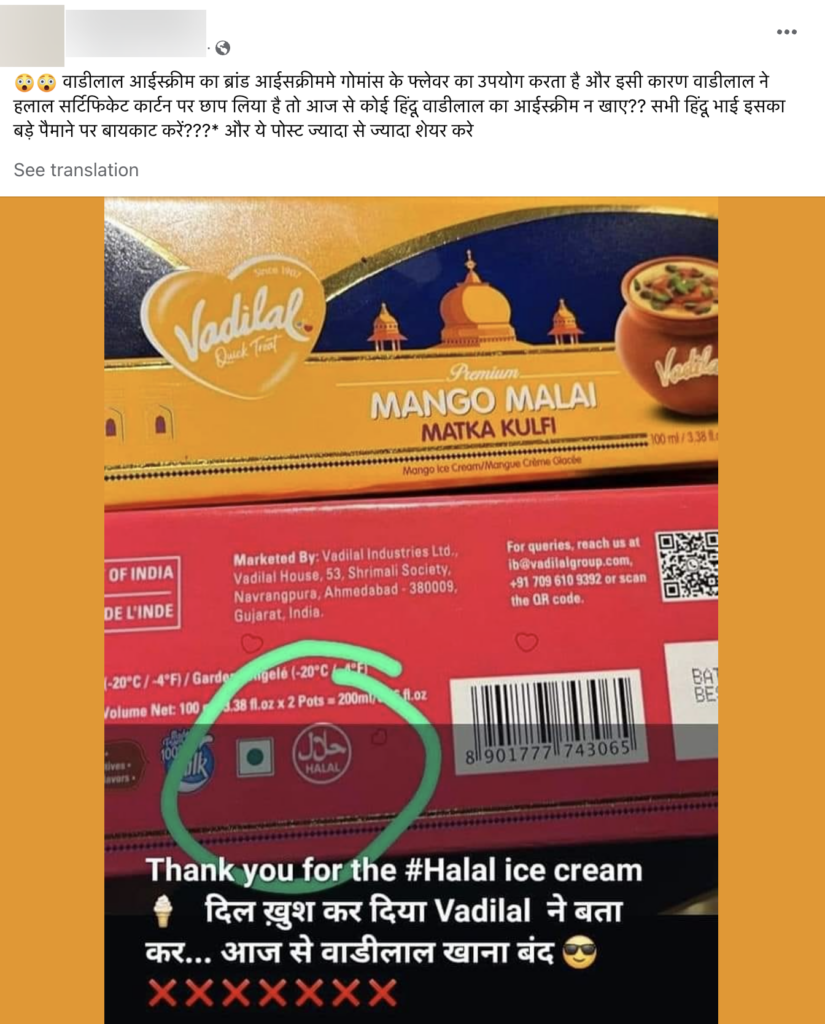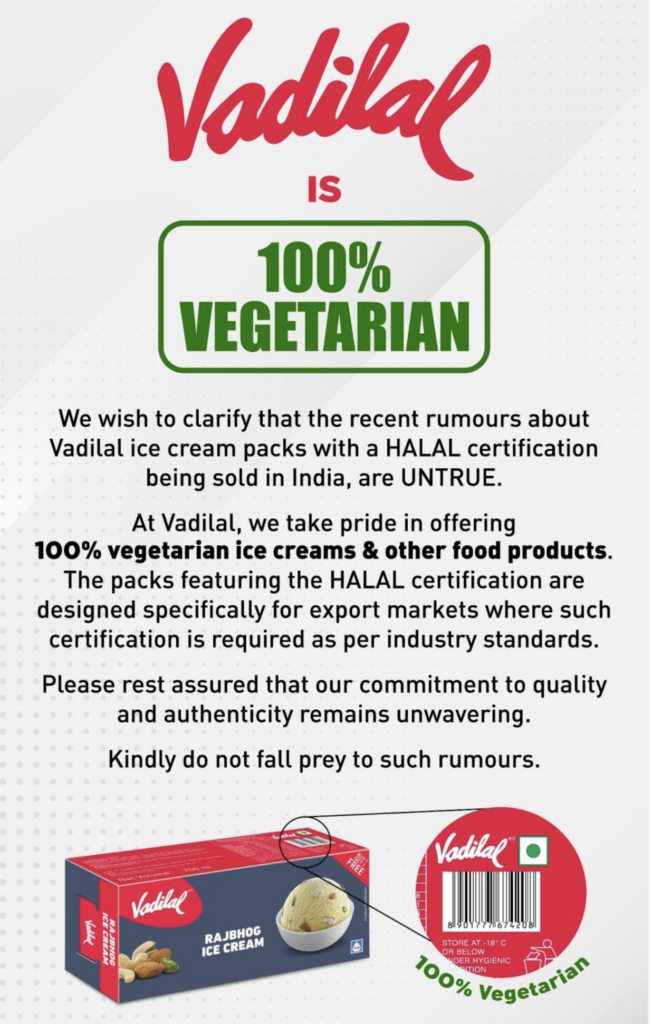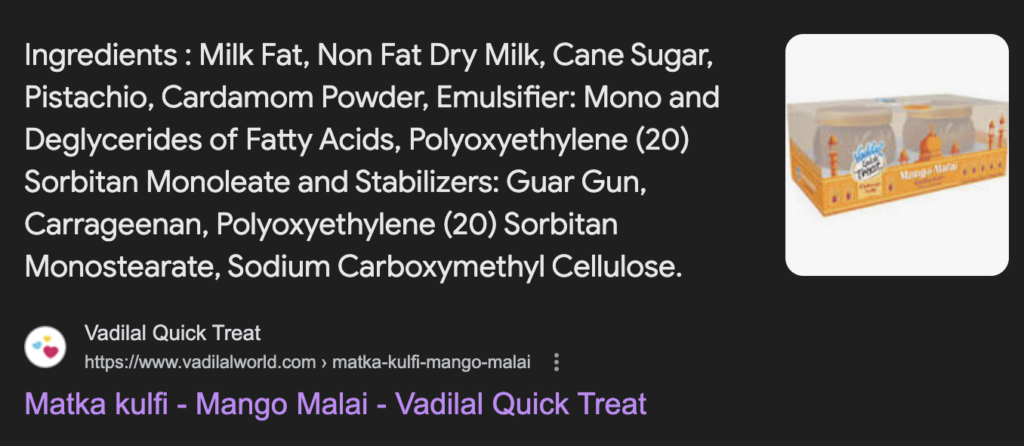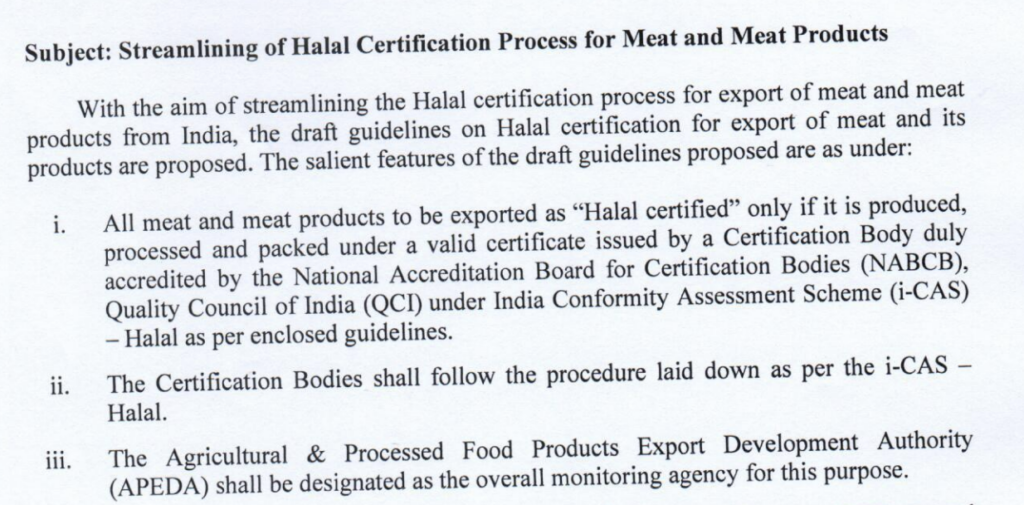A screenshot of Mango Matka kulfi flavoured Vadilal icecream is being shared on social media (here, here, and here) claiming that “Vadilal ice cream brand uses beef flavour in ice cream and that is why Vadilal has printed on Halal certificate carton, so no Hindu should eat Vadilal’s ice cream from today.” Let’s verify the claim made in the post.

Claim: Vadilal uses beef flavour in its ice cream, so the packaging displays a Halal certification mark.
Fact: Vadilal has clarified that their products are entirely vegetarian and that packs with Halal certification are intended solely for export markets. Moreover, Halal certification does not indicate that the products contain beef or meat. Instead, it means that food production, processing, and trade adhere to Islamic principles, which apply to both non-vegetarian and vegetarian foods. Hence, the claim made in the post is FALSE.
On performing a relevant keyword search regarding the viral claim, we found a post published on Vadilal’s official LinkedIn website, in which they clarified the viral claim. In the post, Vadilal said “ We wish to clarify that the recent rumours about Vadilal ice cream packs with Halal certification being sold in India are false. At Vadilal, we take pride in offering 100% vegetarian ice cream and other food products. Packs with Halal certification are specifically designed for the export market, where such certification is required per industry standards. Please be assured that our commitment to quality and authenticity is unwavering. Please do not fall prey to such rumours.”

Further, we looked up the Vadilal World website and reviewed the ingredients listed for Vadilal Mango Matka Malai Kulfi shown in the viral picture. The information provided by Vadilal does not mention the use of any meat.

What does Halal and Halal food mean?
In Arabic, “Halal” means permissible. It is closely linked to Islamic dietary laws, signifying that food production, processing, and trade comply with Islamic principles. These standards apply to both non-vegetarian and vegetarian foods. The meat is considered Halal when the right slaughtering techniques are followed. The Food and Agriculture Organization (FAO) of the United Nations defines Halal Food as that which is permitted under Islamic Law. “All lawful land animals should be slaughtered in compliance with the rules laid down in the Codex Recommended Code of Hygienic Practice for Fresh Meat,” the FAO guidelines say. Likewise, vegetarian food would be generally considered permissible or ‘halal’ unless it contains alcohol. So would fish and shellfish.

What is Halal certification?
Halal certification does not mean that the certified product contains meat. It ensures that food is prepared as per Islamic law. In Islamic countries such as Saudi Arabia, and many others in the Middle East, only Halal-certified products are permitted. As a result, many Indian companies include the Halal certification mark on their exported products. The term Halal can be used not just for food items but for consumables extending to medicines, personal care products, animal feed, etc.,
Who issues them in India?
The Indian government does not require or provide a national body for Halal certification. In India, the Food Safety and Standards Authority of India (FSSAI) requires the use of green and red labels on food packaging to distinguish vegetarian from non-vegetarian items. According to the United States Department of Agriculture, Halal certification in the form of an internationally recognized certificate is not required for trade permissions, whether for exports or imports, in India (USDA).
However, in India, various private agencies offer Halal certification for companies, products, and food establishments. The National Accreditation Board for Certification Bodies (NABCB), part of the Quality Council of India, accredits these Halal certifiers. According to the Directorate General of Foreign Trade (DGFT), meat and its products can only be exported as ‘Halal certified’ if they come from facilities certified by an NABCB-accredited body. Previously, India lacked a government-regulated Halal certification system. To address this, the government introduced the ‘India Conformity Assessment Scheme (i-CAS)’ to standardize Halal certification.

There have been many cases where images of Halal-certified products were incorrectly claimed to be from India, sometimes with misleading explanations about Halal. Factly has previously debunked such claims (here, here, and here).
To sum up, Vadilal clarified that the products sold in India are 100% vegetarian and the halal certification is not for using beef flavour.



